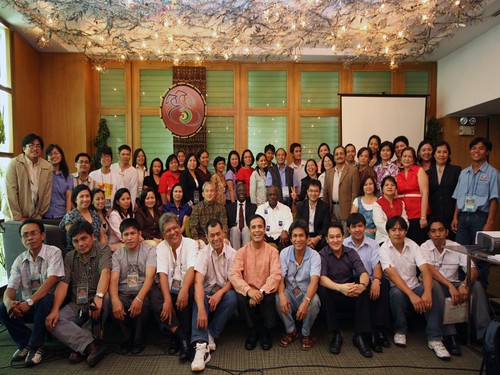
By Jerome Dumlao
The country’s food security was at the forefront of discussions during the 2nd International Fund for Agriculture (IFAD) Philippine Partners Knowledge and Learning Market (KLM) held on October 28-30 in Pasig City.
A fitting follow-up to the first edition held last year, this year’s IFAD-KLM brought together major players in the country’s rural development scene to raise awareness on the burgeoning crisis on food prices, define various measures needed to prevent its escalation, and discuss approaches for sustainability.
Representatives from government agencies, non-governmental organizations (NGOs) and people’s organizations who have been working with IFAD in the Philippines were on hand during the three-day conference.
Secretaries Arthur Yap of the Department of Agriculture (DA) (who sent a representative) and Nasser Pangandaman of the Department of Agrarian Reform (DAR), as well as Undersecretary Zenaida Cuison-Maglaya of the Department of Trade and Industry (DTI) were invited to take part in a panel discussion on “Unstable Food Prices, Food Security and Self-Sufficiency”, the highlight of the 2nd day.
Another highlight of the conference happens on the 3rd day with the awarding of Certificate of Ancestral Domain Titles (CADT) to some 600 families of indigenous peoples in Agusan del Sur. Vice President Noli de Castro was invited to personally hand over the titles.
“The conference is indeed timely considering that the Philippines is one of the countries hardest hit by soaring food prices that have accelerated during the last 18 months,” Sana F.K. Jatta, IFAD Country Programme Manager in the Philippines, said.
The price of rice, the country’s main staple food, has tripled in the first two quarters of this year, forcing millions of Filipinos to line up for subsidized imported rice distributed by the Philippine National Food Authority.
“Filipinos are less food secure now compared to a decade ago; neighboring countries have also caught up,” Jatta added.
Statistics show that the country’s poverty incidence has risen dramatically. According to the latest official poverty statistics released by the National Census and Development Board or NSCB, the nationwide annual per capita poverty threshold was estimated at Php 14,866, compared to Php 12,267 in 2003.
IFAD was established in 1977 as a specialized international financial institution of the United Nations dedicated to eradicating rural poverty. It provides loans to developing member-states such as the Philippines, as well as grants to institutions and organizations in support of activities to strengthen the technical and institutional capacities linked to agricultural and rural development.
Three IFAD loan projects in the Philippines are currently in progress: (1) the Northern Mindanao Community Incentives and Resource Management Project (NCIREMP); (2) the Rural Micro Enterprise Promotion Programme (RuMEPP); and (3) the Cordillera Highland Agricultural Resource Management Project (CHARMP).
(Photo by Mr. Kang Min Su, AFA)



Comments are closed